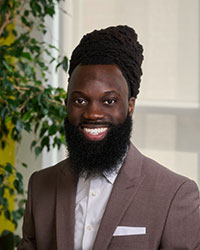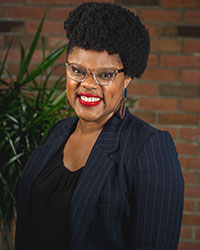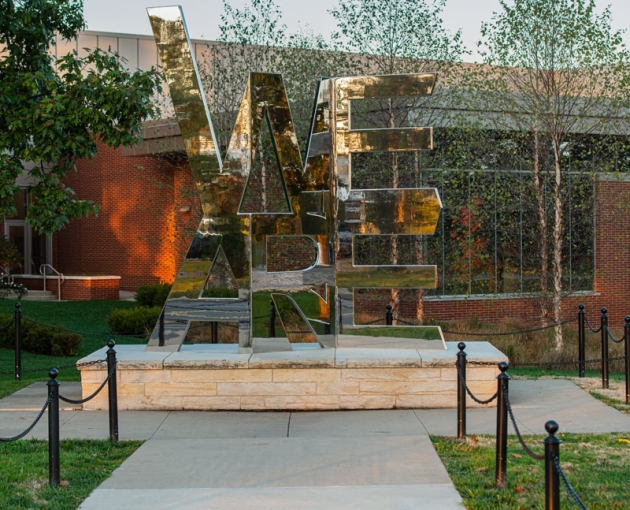Special Journal Issue Explores the Potentialities of Black Research Approaches in Education
Special Journal Issue Explores the Potentialities of Black Research Approaches in Education
By Stephanie Koons
UNIVERSITY PARK, Pa. — Wilson Okello and Tiffany Nyachae, faculty members in the Penn State College of Education, have taken on a transformative project that seeks to reshape educational research through a Black studies lens. As co-editors of the special journal issue in the International Journal of Qualitative Methods titled "(No) Humans Involved: On the Potentialities of Black Research Approaches in Education," they aim to extend the critical work of Sylvia Winter (a Jamaican novelist, dramatist, critic, philosopher and essayist) on Blackness into the realm of educational inquiry.
Building on a Foundation of Black Thought
Okello, assistant professor of higher education, views the journal issue as an opportunity to expand on existing conversations about Blackness in educational research.
“It felt like a project that would allow us to continue the conversation on potentialities of Blackness in educational research,” he said. “It also allowed us to connect as colleagues in the College of Education doing similar work.”
The project began in late 2022, with the goal of integrating perspectives across multiple subfields in education, including literacy, curriculum, and policy. With co-editor DeMarcus Jenkins, formerly of Penn State and now at the University of Pennsylvania, the team brought together diverse expertise to explore how Black research approaches could challenge and transform educational methodologies.
According to Nyachae, assistant professor of education and women’s, gender, and sexuality studies, the journal issue applies the theoretical frameworks from a recent book authored by Okello: “On Blackness, Liveliness, and What It Means to be Human.”
“The special issue is an opportunity for other scholars to play around with the ideas presented in the book, using it as a foundation to create new conceptualizations,” she said. The journal invites education scholars to engage deeply with Black studies, shifting the way Black people and Blackness are examined within the field
Expanding the Boundaries of Research

The journal’s eight entries, including an editorial, reflect a commitment to interdisciplinarity and ethical engagement. Okello emphasized the importance of modeling deep collaboration across subfields.
“How do we demonstrate what ethical interdisciplinary work looks like? How can education shift, be re-made, or even be undone by our engagement with Black studies?” he asked.
For Nyachae, this special issue challenges conventional norms in research methodologies.
“Education is a very practitioner-based field,” she noted. “This issue really forced education scholars to read into Black studies — not just studying Black people but truly thinking through Blackness in a rigorous way.”
She highlighted how some submissions introduced new methodologies framed through the lens of Blackness.
“It was exciting to see pieces that disrupted norms of what it means to ‘humanize’ research,” she said. “That shift in foundation completely changes how we approach methodologies.”
Innovative Contributions and Ethical Imperatives
 Okello and Nyachae emphasized that every contribution to the journal brings a unique perspective to the study of Blackness in education.
Okello and Nyachae emphasized that every contribution to the journal brings a unique perspective to the study of Blackness in education.
“Each piece engages with Blackness in distinct ways,” Okello said. “The range of thinking is so impressive.”
One standout contribution is Nyachae’s own piece, which explores Black girls’ epistemologies and world-making.
“Her work invites us to consider how Black girls construct knowledge and how we, as researchers, can engage with them ethically,” Okello said.
Nyachae underscored the importance of critically examining research ethics, particularly in relation to historically marginalized communities.
“Often, people assume that simply including voices is ethical,” she explained. “But how are we interpreting those voices? Are we applying a Black feminist critique? Ethical can mean everything and nothing at the same time.”
For both scholars, the goal of the journal issue is to elevate the standards of ethical engagement in educational research.
“Many communities have been harmed by research,” Nyachae said. “The bar for what is considered ethical is too low. This special issue challenges that.”
Looking Ahead: The Impact and Future of Black-Centered Educational Research
Looking to the future, Okello hopes the journal issue serves as a catalyst for continued innovation in Black research approaches.
“The hope is that this work is generative,” he said. “That it allows folks to do their work differently, and that it stands as an ethical extension of the long tradition of Black study.”
Nyachae reflected on how the project has shaped her own scholarship.
“I was honored to be invited to co-edit this issue,” she said. “It pushed me in new ways, especially in engaging deeply with Black studies.”
Her research focuses on improving educational experiences for students of color, particularly in areas of teacher professional development, literacy workshops and curriculum development for Black girls.
“I always ask, ‘How does this matter to real people?’” she said. “This project reinforced the need to make our scholarship meaningful and impactful.”
Despite working in different educational spaces — Okello engaging more with higher education and Nyachae in K-12 settings — their collaboration highlights the transdisciplinary nature of Black studies in education.
“We both work with curriculum in different ways,” Nyachae noted. “But our research spheres inform each other.”
Okello added, “We don’t always make those connections explicit, but the ways they inform each other are absolutely there.”
As the journal issue reaches a wider audience, its editors hope it will inspire further engagement with Black studies in education, challenging scholars to rethink methodologies, ethics and the broader implications of their research.
“This is an invitation,” Okello said. “An invitation to do more than just nod at Black studies — to truly engage, to push forward and to create new possibilities.”
____________________________________________________________________________

